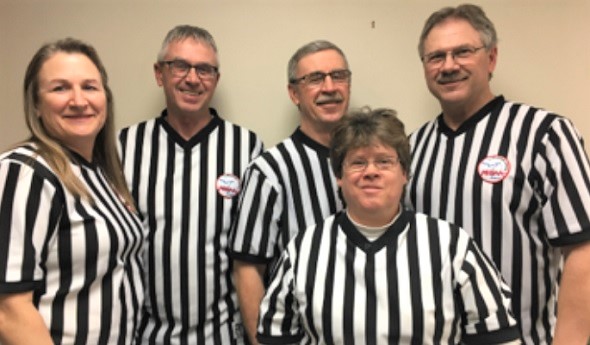
Wozniak 'Crew' Serves Together in Stripes
May 1, 2019
By Tim Miller
Mio teacher, former coach and graduate
If you were to attend a high school basketball game in northeast Michigan, or watch the local sports highlights from the evening on TV, you might see a member of the Wozniak family running up and down the basketball court.
You won’t see them dribbling the ball, or pulling up for a jump shot. The pressure to get a rebound, or to play defense, is no longer part of the game plan for them. The red jersey they once wore so proudly in high school has been replaced by a black and white uniform that’s worn only by referees.
Take a drive north on M-65 and you will eventually reach the home of the famous Potato Festival, located in Posen, Michigan. Don’t expect to see a McDonald’s, Subway, or even a stoplight when you arrive. The town consists of a few small businesses, managed by a group of people who take pride in calling Posen their home.
One such family is Stanley and Virginia Wozniak, who just finished celebrating 68 years of marriage. During this time, they became the proud parents of Chuck, Ken, Cheryl, Frank, Donna, Mary Ellen, Michelle, and Linda.
Although I’ve never met Mr. and Mrs. Wozniak, it’s obvious to me, and anyone who knows their children, that they instilled some very important life lessons in them while raising them. One such lesson was getting involved. At one time Stanley was an official, so I guess it’s no surprise to see his children follow in his footsteps.
Living in northern Michigan during the winter can be brutal. Frigid temperatures and a large accumulation of snow can make it challenging. The key to surviving these long hard winters is staying busy. One such way is to attend a high school sporting event, and like so many people throughout the area, I watch as many games as I can.
Whether I’m attending a home game, or traveling out of town to an away game, it’s not uncommon to walk into a high school gym and see the Wozniak officiating crew from Posen standing courtside, patiently waiting to start the game.
What’s been striking to me over the years is to see them working as a unit, game after game. Rarely have I seen one of them working on another crew. Another lesson learned from home: family staying together. Years of experience has allowed them to officiate a regular-season game or much-anticipated playoff game with confidence.
When the game begins, I like sitting by myself. I look for the little things that players do or don’t do. I also watch the officials and compare my observations with their calls. Having watched them for many years in a variety of games, I’ve been impressed with their ability to call a game, regardless of whether it’s two teams battling to stay out of last place or a championship game packed full of screaming fans. Their passion for the game and commitment to getting it right has earned the respect of coaches, players and fans throughout northern Michigan.
They would be the first to admit they’ve made a mistake or missed a call here and there. Another lesson learned from home: be honest and stay humble. There have been games where the fans, players and coaches have disagreed with them, and a variety of facial expressions and comments have been made. It doesn’t stop them; they just keep moving forward.
They know this type of behavior comes with the territory, even though it’s the reason why so many officials have decided to quit. Another lesson learned from home: don’t give up.
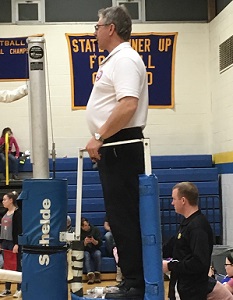 The same drive that earned Donna and Mary Ellen both Female Athlete of the Year at Posen Consolidated Schools – in 1978 and 1981, respectively – fuels them on the court. While attending a girls junior high game, I witnessed Donna put an end to a loud-mouth fan. She calmly stopped the game, walked over to him, looked him square in the eyes and said, “Are you done?”
The same drive that earned Donna and Mary Ellen both Female Athlete of the Year at Posen Consolidated Schools – in 1978 and 1981, respectively – fuels them on the court. While attending a girls junior high game, I witnessed Donna put an end to a loud-mouth fan. She calmly stopped the game, walked over to him, looked him square in the eyes and said, “Are you done?”
To which he replied “yes.” After speaking with him and making her point, she continued to officiate the game all by herself. For some reason, she was the only official for the game. She didn’t complain or make excuses; she simply made the best of the situation in front of her. Another lesson learned at home: don’t complain and do your best.
I’ve also seen Mary Ellen straighten out a few coaches and players during her career. Like her sister Donna, she’s not afraid to put an end to poor sportsmanship during the game.
Being an official isn’t easy. They’re constantly under scrutiny and harassment by unruly fans, coaches and players. The sacrifices they make to officiate a game often go unnoticed or are rarely even discussed. I wonder how many dinners they’ve missed with their families.
The technology used at the games has changed over time. From the Kodak camera, to the 35 millimeter, to the camcorder. And now the popular cell phone, perhaps the best and worst device ever created. Now anyone can snap a picture or record a video of an official. Spend a few minutes adding disrespectful comments, and post it online. Even through this evolution of tasteless unwarranted behavior, the Wozniaks keep rolling on.
Like all officials, they don’t do it for the money! What little they make can’t possibly offset the cost of maintaining their vehicles, gas, tires and worn out parts along the way. They do it because they love and respect the game. As spectators, we often place the blame on officials when we lose. However, I’ve never heard anyone say we won because of the officials. In my 40-plus years of watching sports, I have never seen an official miss a free throw or turn the ball over during the game, nor have I seen an official play sloppy defense. I’ve never seen them get out-coached or out-hustled by the opposing team.
We also have a tendency to undervalue the officials. Instead, we put our focus on the coaches, players and the games. That all changes in a split second when we think a foul should be called. Then, all eyes are fixed on the official, and immediate results are expected. The official is expected to see everything, which is an unrealistic expectation.
As officials, the Wozniaks do an outstanding job. Running up and down the court with a whistle in your mouth can’t be easy. I wonder how many of us could do that. I can only imagine how many inadvertent calls would be made as we tried keeping up with the players. Trying to spot every rule infraction is impossible, and yet, they keep striving to do their best. They’re not perfect, nor would you ever hear one of them claim to be. However, they’re doing something that the majority of fans, coaches and players would never even consider! They’re willing to put that official’s uniform on and have the courage, determination and commitment to doing the best job they can.
Over the years, I’ve had the pleasure of getting to know them. They have the ability to look past those negatives. They choose to remember the big games, the respectful players, the quality coaches, the new friendships they made, and most important of all, spend time on the court with one another.
Here are some of their amazing accomplishments:
• Chuck has been an official for 46 years. During this time, he has officiated multiple playoff games for girls and boys basketball, including MHSAA Semifinal and Final games. He was the track coach at Posen Consolidated Schools for 38 years and is currently a member of the Posen Fire Department.
• Ken has been an official for 43 years. He has officiated multiple playoff games for girls and boys basketball as well, including Semifinal and Final games. He currently serves on the Posen Consolidated School Board and has for the last 19 years – 17 as school board president.
• Frank has been an official for 42 years and has been selected to work a Basketball Semifinal. He coached junior varsity boys basketball for four years and umpired youth softball and basketball for many more. He was also the director of the local softball tournaments in Posen for 13 years.
• Donna has been an official for 41 years, working multiple playoff games for girls and boys basketball including Semifinals and Finals – including a boys Semifinal. She may be one of the most respected officials in Michigan, at any level! She coached softball at Posen Consolidated Schools and coached youth softball and basketball in the community for many years.
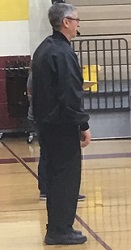 • Mary Ellen has been an official for 34 years and was selected to officiate a Girls Basketball Semifinal. She coached the varsity girls basketball team at Posen Consolidated Schools for nine years. She is currently an assistant coach for the Alpena Community College softball team.
• Mary Ellen has been an official for 34 years and was selected to officiate a Girls Basketball Semifinal. She coached the varsity girls basketball team at Posen Consolidated Schools for nine years. She is currently an assistant coach for the Alpena Community College softball team.
• Linda officiated volleyball for 13 years. She volunteers at a variety of youth events throughout the community. She runs the scoreboard at athletic events, along with keeping the books. She is currently the class advisor for the graduating class of 2019 at Posen Consolidated Schools. She’s also involved in the chamber of commerce, where she served as treasurer for eight years.
• Although Cheryl doesn’t officiate, she’s involved in her community in many ways. She volunteers her time in the sports booster program and the little league programs. She was the secretary of the sports boosters for 15 years and selected as its “Volunteer of the Year.” She’s a strong supporter of promoting youth sports in her community.
• Michelle is also a strong supporter of youth programs in Posen and Alpena. She was selected as Female Athlete of the Year at Posen Consolidated Schools in 1983 and was appointed by former Governor Rick Snyder to serve on the Michigan Public Health Advisory Council. Like the rest of her siblings, she continues to stay involved in her community and volunteers in a variety of ways.
Aside from high school basketball games, the Wozniaks also have officiated other sports such as volleyball, track, and softball, and basketball at the college level.
I’m not sure how many more years the Wozniaks will continue to officiate. Hopefully for the coaches, players and fans, they’ll continue until they can’t run up and down the court anymore.
I can’t imagine how many whistles they’ve went through, or how many shoes they’ve bought along the way. The miles they’ve put on their vehicles, or the worn out tires they’ve replaced. The time they’ve missed with their families, or the TV shows they couldn’t watch. The quick meals eaten on the road, or the leftovers waiting at home.
Jonathan Lockwood Huie once said, “The path to your own happiness is usually found in service.” With all those years of officiating games and volunteering in their community, the Wozniaks understand the value of service. My guess is they’ve never heard of Johnathan Lockwood Huie, but his quote is deeply embedded in their DNA. They learned it from their parents; it’s the Wozniak way. Get involved, stay close to family and cherish your time together.
It’s the same formula that Stanley and Virginia used to spend 68 years together in marriage. So, Mr. and Mrs. Wozniak, thanks for teaching your children all those life lessons. To their spouses and families, thanks for sharing them. To the Wozniak crew, thanks for all the years you’ve dedicated to high school sports!
I can only imagine what they’ve seen and experienced during this time span. My guess is they could write a book filled with memories. The long drives, the late nights, the fall colors, the cornfields, the pumpkin patches, the icy roads, the snowstorms, the road construction, the price of gas, the vehicle mishaps, the missed deer, the big bucks, the coaches both good and bad, the great players and the not-so-great, the big games, the ejections, the technicals, the broken scoreboards, the athletic directors, the uniform styles, those ugly tube socks, the hairstyles, the rule changes, the news clips, the gyms, the good fans and the bad ones, the songs on the radio, the tickets, those aching body parts, who drove the most, who napped the most and the friendships made along the way.
Finding a family like the Wozniaks is rare. Becoming an official is one thing; doing it for 30 to 40 years is remarkable. What an impressive run – what a commitment to high school sports. So many games, so many stories, a lifetime of memories in the gym, on the track, at the softball field and in the car.
Eventually, the time will come when they decide to hang up their whistles for good. After it happens, I can picture them all sitting around the table on a cold winter night, drinking a cup of hot coffee, reflecting on their careers and all those games, all those memories, all those years, the stories, the laughs, and the time spent together as a family.
PHOTOS provided by Tim Miller.
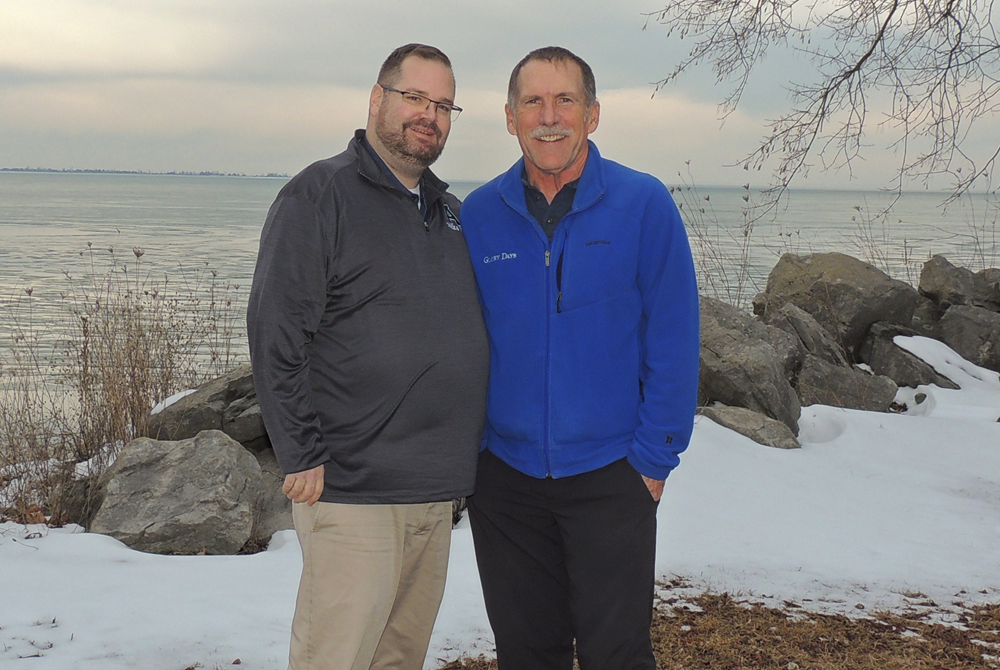
Retired Official Gives Alpena AD New Life with Donated Kidney - 'Something I Had to Do'
By
Geoff Kimmerly
MHSAA.com senior editor
May 3, 2024
TAWAS CITY – Jon Studley woke up Feb. 20 with a lot of fond memories on his mind, which turned into a collection of 47 photos posted to Facebook showing how he’d lived a fuller life over the past year with Dan Godwin’s kidney helping power his body.
There was Studley at the beach, taking a sunset shot with wife Shannon and their 5-year-old daughter Maizy. In others Dad and daughter are at the ice rink, making breakfast and hitting pitches in the yard. Studley made it to Ford Field to cheer on the Lions, supported his Alpena High athletes at MHSAA Finals and traveled to Orlando for a national athletic directors conference.
Their faces are beaming, a far cry from much of 2021 and 2022 and the first few months of 2023 as the Studleys and Godwins built up to a weekend in Cleveland that recharged Jon’s body and at least extended his life, if not saved it altogether.
“People that saw me before transplant, they thought I was dying,” Studley recalled Feb. 21 as he and Godwin met to retell their story over a long lunch in Tawas. “That’s how bad I looked.
“(I’m) thankful that Dan was willing to do this. Because if he didn’t, I don’t know what would’ve happened.”
By his own admission, Studley will never be able to thank Godwin enough for making all of this possible. But more on that later.
Studley and Godwin – a retired probation officer and high school sports official – hope their transplant journey together over the last 23 months inspires someone to consider becoming a donor as well.
For Studley, the motivation is obvious. Amid two years of nightly 10-hour dialysis cycles, and the final six months with his quality of life dipping significantly, Studley knew a kidney transplant would be the only way he’d be able to reclaim an active lifestyle. And it’s worked, perhaps better than either he or Godwin imagined was possible.
For Godwin, the reasons are a little different – and admittedly a bit unanticipated. He’d known Studley mostly from refereeing basketball games where Studley had served as an athletic director. He’d always appreciated how Studley took care of him and his crew when they worked at his school. But while that was pretty much the extent of their previous relationship, some details of Studley’s story and similarities to his own really struck Godwin – and led him to make their lifelong connection.
“It’s been rewarding for me. I have told Jon, and I’ve said this to anyone who would listen, that I’m grateful and feel lucky that I’ve been part of this process,” Godwin said. “I don’t feel burdened. I don’t feel anything except a sense of appreciation to Jon that he took me on this journey. I didn’t expect that, but that’s how I feel.”
Making a connection
As of March, there were 103,223 people nationwide on the national organ transplant waiting list, with 89,101 – or more than 86 percent – hoping for a kidney, according to data from the U.S. Department of Health and Human Services and the Organ Procurement and Transplantation Network (OPTN). More than 46,000 transplants were performed in 2023, including the sharing of more than 27,000 kidneys.
Godwin giving one to Studley was among them.
Studley, 43, has served in school athletics for most of the last two decades since graduating with his bachelor’s degree from Central Michigan University. After previously serving as an assistant at Mount Pleasant Sacred Heart, he became the school’s athletic director at 2009. He moved to Caro in 2012, then to his alma mater Tawas in 2015 for a year before going to Ogemaw Heights. He then took over the Alpena athletic department at the start of the 2020-21 school year, during perhaps the most complicated time in Michigan school sports history as just months earlier the MHSAA was forced to cancel the 2020 spring season because of COVID-19.
He's respected and appreciated both locally and statewide, and was named his region’s Athletic Director of the Year for 2019-20 by the Michigan Interscholastic Athletic Administrators Association. Concurrently with serving at Sacred Heart and earning his master’s at CMU, Studley served as athletic director of Mid Michigan College as that school brought back athletics in 2010 for the first time in three decades. He also served four years on the Tawas City Council during his time at Tawas High and Ogemaw Heights.
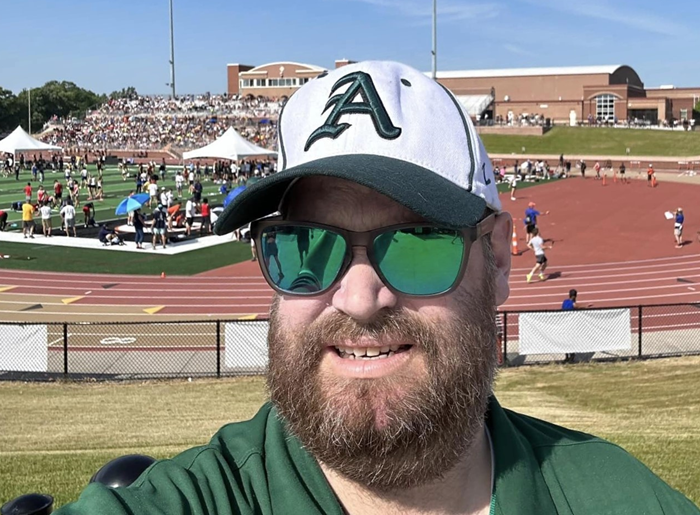 Toward the end of his senior year of high school in 2001, Studley was diagnosed with Type 2 diabetes. For the next two decades, he managed his diabetes primarily with insulin and other medication. But during that first year at Alpena, his health began to take a turn. Studley had been diagnosed with a heart condition – non-compaction cardiomyopathy – which led him to Cleveland Clinic for testing. A urine test in Cleveland indicated his kidneys might not be working like they should – which led to a trip to a specialist and eventually the diagnosis of kidney failure and the start of dialysis, with a kidney transplant inevitable.
Toward the end of his senior year of high school in 2001, Studley was diagnosed with Type 2 diabetes. For the next two decades, he managed his diabetes primarily with insulin and other medication. But during that first year at Alpena, his health began to take a turn. Studley had been diagnosed with a heart condition – non-compaction cardiomyopathy – which led him to Cleveland Clinic for testing. A urine test in Cleveland indicated his kidneys might not be working like they should – which led to a trip to a specialist and eventually the diagnosis of kidney failure and the start of dialysis, with a kidney transplant inevitable.
Dialysis long has been a standard treatment for people with kidney issues. But it can take a toll. In Studley’s case, that meant being tired all the time – to the point of falling asleep at his desk or having to pull over while driving. He wasn’t receiving enough nutrients and was unable to lift things because of the port for the dialysis tube. Extra fluid building up that his body wouldn’t flush made him constantly uncomfortable.
The next step was transplant, and in July 2021 he was approved to receive a kidney.
The Studleys thought they had a prospect early on, as an aunt on Shannon’s side was a candidate for a paired match – her blood and tissue types weren’t a match for Studley, but matched another person on the waiting list whose donor would be a candidate to give Studley a kidney. But that didn’t work out.
Others showed interest and asked about the process, especially after Studley’s 20-year class reunion in 2021, but nothing concrete came about. Amid the early disappointment, Studley took some time to consider his next move – and then put out a plea over Facebook that fall to his close to 1,000 connections hoping that someone, anyone, might consider.
“I took a week to really think about it – this is what I’m asking for someone to do. I had to get over it in my mind that it was OK to ask,” Studley said. “I’m going to ask someone to make a sacrifice for me, and that’s not me. I always want to help everybody else.”
Godwin is that way too. And immediately after reading Studley’s post, he knew he needed to consider making a call.
Strong match
Godwin had moved to Tawas City from Midland in 2014, and after a few years off from officiating decided to get back on the court that following winter.
He thinks he and Studley may have crossed paths at some point during Studley’s tenures at Sacred Heart and Caro, but it was at Tawas where they got to know each other. Although Studley stayed at Tawas just one school year, Godwin continued officiating for him at Ogemaw Heights – and in fact, Godwin’s final game in 2018 was there, during the District basketball tournament. That night, during the first quarter, Godwin tore the plantar fasciitis in his left foot. He didn’t know if he’d be able to finish the game – the officials from the first game that night stuck around to step in just in case – but thanks in part to Studley connecting Godwin with the Alpena trainer during halftime, he was able to get through the final two quarters and finish his officiating career on his feet.
They’d become Facebook “friends” at some point, so Godwin had seen Studley’s posts over the years with Shannon and Maizy. And when he saw Studley ask for help, something hit him – “immediately.”
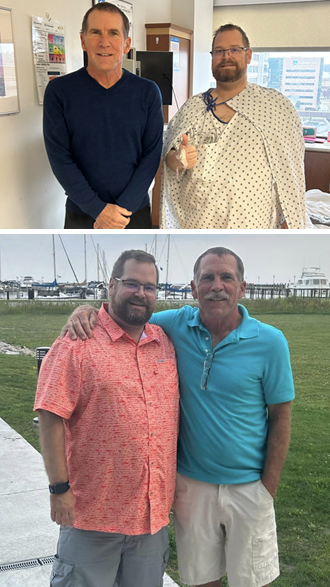 “I have a 5-year-old granddaughter, almost exactly the same age as Jon’s, and I’m the dad of one child, a daughter, so there were those connections,” Godwin said. “It almost didn’t feel like there was a choice. It felt like it was something I had to do.”
“I have a 5-year-old granddaughter, almost exactly the same age as Jon’s, and I’m the dad of one child, a daughter, so there were those connections,” Godwin said. “It almost didn’t feel like there was a choice. It felt like it was something I had to do.”
Godwin is 66 and always has been in good health. He’s also always been an organ donor on his driver's license and given blood, things like that. But he had never considered sharing an organ as a living donor until reading Studley’s post.
He read it again to his wife Laurie. They talked it over. He explained why he felt strongly about donating, even to someone he didn’t know that well. After some expected initial fears, Laurie was in. Their daughter had the same fears – What about the slight chance something could go wrong? – but told Laurie she knew neither of them would be able to change her dad’s mind.
“It took me a while to get on board with it, even though I knew in the vast majority of cases somebody who donates an organ is going to be absolutely fine. It’s still major surgery,” Laurie said. “I guess he was just feeling so much like it was something he wanted to do, and he is a very healthy physically fit person. So I felt the odds were really good that he was going to be fine.
“And really, probably, the deciding factor was Maizy. We have a granddaughter the same age, so we were just thinking she needs a dad.”
After a few more days of contemplation, Dan called Cleveland Clinic to find out how to get started.
Then he texted Studley.
“I was nervous saying yes. At first, I didn’t know what to say – I just kept saying, ‘You don’t have to do this, but I appreciate it,’” Studley said. “I never want to have somebody do something for me unless (the situation is dire) … so I told him thank you and I appreciate it, and no pressure.”
Generally, Studley said, the donor and recipient don’t receive information on how the other person is progressing through the process. Godwin, however, kept Studley in the loop, which was a good thing. “But then you’re wondering if it’s going to happen,” Studley said, “if it’s truly a match.”
The initial blood test showed that Godwin wasn’t just a match, but a “strong” match, meaning they share a blood type – the rarest, in fact – and Godwin also didn’t have the worrisome antibodies that could’ve caused his kidney to refuse becoming part of Studley’s body.
That was amazing news. But just the start. “There was so much more we had to go through just to get to surgery day,” Studley said.
Long road ahead
Studley relates the transplant process to a job interview. After meeting with a potential boss, the candidate must wait for an answer – and it could come the next day, or the next week, or months later.
There were several more tests for both to take to make sure the transplant had not only a strong enough chance of being successful, but also wouldn’t be harmful for either of them.
“Right up until the time of the donation, (things) can happen. Like they did blood work on me the Friday before the kidney transplant on Monday, and if that had showed something they were going to send me home,” Godwin said. “So I just kept thinking, is this going to work? It seemed that there were more things that could go wrong than the possibility that it could go right. And that sets everybody up for disappointment – me, because I was invested in doing it, and of course Jon and his family because it was important to them.”
Godwin made a trip to Cleveland Clinic in November – about three months before the surgery. It wasn’t a great visit. His electrocardiogram showed a concern, and a few suspicious skin lesions were an issue because donors must be cancer-free. Almost worse, he couldn’t get in for a follow-up appointment for six weeks.
The wait felt longer knowing not only that there was a possibility for disappointment for Studley, but also the potential something could be unwell with Godwin. But then came good news – at his follow-up, Godwin aced his stress test, alleviating any heart concerns, and the dermatologist said the lesions were basal cell carcinoma and not considered risky to the transplant.
Over the next three months, both Godwin and Studley continued to do whatever they could to keep the transplant on track. To avoid COVID, Godwin and his wife isolated as much as they could, and Studley began wearing a mask frequently at work. Godwin cut out alcohol and coffee and began walking regularly to keep in tip-top shape.
In January 2023, both got the final OK, and the surgery was scheduled for Feb. 20.
But that wasn’t the end of the anxiety.
Studley also had undergone a series of tests and doctor visits, and two days before the transplant he had to get a tooth removed to avoid a possible infection.
Then, on the way from Alpena to Cleveland, Studley’s vehicle hit a deer.
“How is this going to go now?” he recalled thinking. “This is how it started. What’s going to happen now?”
Both arrived in Cleveland safely, eventually. The families stayed apart all weekend, Studley and Godwin communicating briefly by text to check in. There were a few more stop-and-go moments. Godwin’s Friday blood work showed something unfamiliar that ended up harmless. On the day of the surgery, Studley was wheeled to just outside the operating room – and then taken back to his hospital room for another 15 minutes of suspense. Once Studley made it into the operating room, his doctors had to pause during the surgery to tend to an emergency.
But finally, the transplant was complete. And seemingly meant to be. Godwin’s kidney was producing urine for Studley’s body before the surgeons had finished closing him up.
Back on his feet
Studley said he knew he’d be fine once he could start walking the hallways at the hospital; he started doing so the next morning. Later that same day after transplant, on the way back from one of those walks, he saw Godwin for the first time since they’d both arrived in Cleveland. “It was absolutely emotional,” Godwin said.
Godwin went home four days after the surgery. Studley stayed the next month with appointments and labs twice a week. Shannon remained with him the first week, then friends Mike Baldwin and Josh Renkly and Studley’s father Larry took turns as roommates for a week apiece.
For the first three months, including his first two back in Alpena, Studley couldn’t go anywhere except for the trip to Cleveland every other week – which has now turned into every other month with virtual appointments the months in between. Total he missed about six months of work – and thanked especially assistant athletic director and hockey coach Ben Henry for shouldering the load in his absence.
Studley’s checkups are full of more good news. His body is showing no signs of rejecting the kidney. And as long as he keeps his diabetes under control, that shouldn’t affect his new organ either.
Shannon sees the difference while comparing a pair of family trips. The Studleys went to Disney World while Jon was on dialysis, and she said he made it through but got home just “depleted.” This past spring break, the family went to Gatlinburg, Tenn., and Jon had visibly more energy for hiking and other activities. The last six months of dialysis, Jon was sleeping a lot, but this spring he’s helping coach Maizy’s T-ball team and overall is able to spend more quality time with her.
“Most of (Maizy’s) life she’s only known him as sick Dad,” said Shannon, a counselor at Alpena’s Thunder Bay Junior High. “He wasn’t able to do a lot of things with her, and I’ve seen a lot more of that, and I think she notices.”
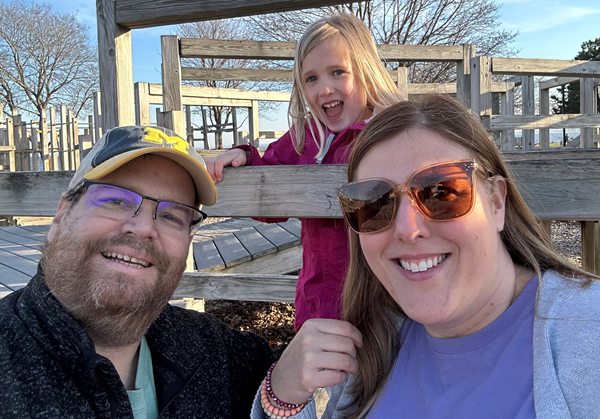 Jon will be taking anti-rejection medicine and a steroid every 12 hours for the rest of his life, but that and some other little life adjustments are more than worth it. All anyone has to do is look at those 47 photos from the Facebook post to understand why.
Jon will be taking anti-rejection medicine and a steroid every 12 hours for the rest of his life, but that and some other little life adjustments are more than worth it. All anyone has to do is look at those 47 photos from the Facebook post to understand why.
Godwin said he feels better now than he did even before surgery. He does his checkups with Cleveland Clinic over the phone. He also said that if Studley had been found at some point late in the process to be unable to except the kidney, Godwin still would’ve given it to someone else on the waiting list. “I was so invested at that point,” Godwin remembered. “That kidney was going.”
The two families got together for a reunion in August in Tawas, where they had lunch and walked the pier and the Godwins met Maizy for the first time. She doesn’t really get what’s transpired, but definitely notices Dad doesn’t have a tube coming out of his body at night anymore.
And it’s clear the two men value the connection they’ve made through this unlikely set of circumstances.
“His attitude has been inspiring,” Godwin said. “Because you’ve been through the mill (and) I’ve never heard a negative thing, ‘poor me’ or anything. And I think maybe that’s what helps keep you going.”
“You talk to people who know Dan, and they said, ‘That’s Dan. That’s what Dan does,’” Studley said, speaking of Godwin’s gift and then addressing him directly. “The hardest part for me, the biggest struggle … is there’s no way I’m going to ever be able to thank you for this.
“It’s like the post I posted yesterday on Facebook. I posted pictures of everything I had done in the last year, and a lot of it was stuff that I hadn’t done in a long time. My way to thank Dan is just living my life the best I can, enjoying my family. … For me, it’s changed my perspective.”
As lunch finished up, Godwin did have one ask in return – not for one of Studley’s organs, but to be part of a special moment that helped drive him to donate 12 months earlier.
“This isn’t the venue, but I’ve thought about this a lot. I’ve never asked for anything and I don’t want anything,” Godwin said, “but I would like to go to Maizy’s wedding.”
“Yeah, you … yes. Yes,” Studley replied. “You can go to anything you want to go to with my family.”
“I’d like to be there.”
“You will definitely be there.”
“I was at my daughter’s wedding,” Godwin said, noting again that connection between the men’s families, and the importance he felt in Studley being there for Maizy like he’d been there for his child.
“You say that, but there were times I didn’t know if I’d make it to Maizy’s wedding. I might not make it to see her graduate. So …” Studley trailed off, ready to take the next step in his life rejuvenated.
Studley emphasized the continuing need for kidney donors and refers anyone interested in learning more to the National Kidney Registry.
PHOTOS (Top) Alpena athletic director Jon Studley, left, and retired MHSAA game official Dan Godwin take a photo together on the shore of Lake Huron one year after Godwin donated a kidney to Studley. (2) Studley cheers on Alpena athletes during last season’s MHSAA Track & Field Finals at Rockford High School. (3) Godwin and Studley meet for the first time after the transplant, and again six months later. (4) Studley, his wife Shannon and daughter Maizy enjoy a moment after Jon had returned to good health. (Top photo by Geoff Kimmerly; other photos provided by Jon Studley.)

